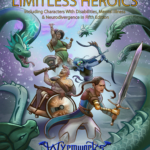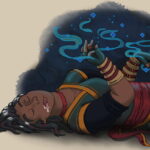Delusions

You have experiences or beliefs that others do not share, but you absolutely believe them to be true. Choose or roll on the following table. If you have multiple traits, you may choose or roll another Delusion trait or Intrusive Thoughts as one or more of them.
function displayTrait() { const rand = Math.floor(Math.random() * 100) + 1; let trait; if (rand >= 1 && rand = 7 && rand = 12 && rand = 18 && rand = 23 && rand = 30 && rand = 38 && rand = 45 && rand = 49 && rand = 56 && rand = 66 && rand = 74 && rand = 76 && rand = 83 && rand = 89 && rand = 97 && rand = 99 && rand <= 100) { trait = "Quick-motion phenomenon"; } document.getElementById("trait").innerHTML = trait; }
| d100 | Delusion |
|---|---|
| 1–6 | Atmosphere |
| 7–11 | Awareness |
| 12–17 | Control |
| 18–22 | Dysmorphopsia |
| 23–29 | Erotomantic |
| 30–37 | Grandiose |
| 38–44 | Ideas |
| 45–48 | Imposter |
| 49–55 | Intensity |
| 56–63 | Jealousy |
| 64 | Macropsia |
| 65 | Macrosomatognosia |
| 66–71 | Memory |
| 72 | Micropsia |
| 73 | Microsomatognosia |
| 74–75 | Pelopsia |
| 76–82 | Persecutory |
| 83–88 | Reference |
| 89–96 | Somatic |
| 97–98 | Teleopsia |
| 99–00 | Quick-motion phenomenon |
- Atmosphere. Something feels wrong about your environment, but you can’t figure out what, yet the feeling is undeniable. Because of your heightened awareness, you have a +(IE) on Wisdom (Perception) checks but a −(IE) penalty on Wisdom (Insight) checks.
- Awareness. You are intensely aware of a particular experience unrelated to your current circumstances or condition. Because of the distraction, you have a −(IE) penalty on initiative rolls, attack rolls and ability checks made as reactions, and Wisdom (Perception) checks.
- Control. You believe that you are being controlled, physically or mentally, by an external force. This causes a −(IE) penalty to Wisdom (Insight) checks.
- Dysmorphopsia. Straight lines or edges appear to be wavy to you. This altered perception gives you a −(IE) penalty on ranged attack rolls with at least partial cover.
- Erotomantic. You believe that someone, usually a public figure, is in love with you. You have a −(IE) penalty on Wisdom (Insight) checks related to this person, and you plan and act according to this belief.
- Grandiose. You believe that you are greater in some way than you are and act accordingly. This may manifest in a belief that you have a relationship with a famous being, that you are a famous being (past or present), or that you have exceptional talents, abilities, or powers. Some examples may include believing you have abilities of a character level higher than you’ve achieved, magic or proficiencies, or another character class that you don’t have. You will act on such beliefs unless convinced by an ally against following a specific harmful course of action, either through roleplay or an opposed Charisma (Persuasion) check by the ally.
- Ideas. You believe something fantastical to be true or that you are being affected by some kind of magic that is not in fact affecting you. The GM and player should discuss this and determine a specific belief. Depending on the belief, the game effects can vary widely, so find the trait that most closely reflects this belief, and adjust accordingly.
- Imposter. You believe that one or more important people in your life are imposters (actors playing the role of those people) and will act according to that belief. You will act on such beliefs unless convinced by an ally against following a specific harmful course of action, either through roleplay or an opposed Charisma (Persuasion) check by the ally.
- Intensity. You have a belief that is real, but you put an unreal amount of importance on it, such as a minor vermin infestation that you believe to be catastrophic. You will act on such beliefs unless convinced by an ally against following a specific harmful course of action, either through roleplay or an opposed Charisma (Persuasion) check by the ally.
- Jealousy. You believe that a friend or partner is betraying you. You will act on such beliefs unless convinced by an ally against following a specific harmful course of action, either through roleplay or an opposed Charisma (Persuasion) check by the ally.
- Macropsia. Objects appear (IE) × 20% larger than they are in real life. You have a −(IE) penalty on all attack rolls.
- Macrosomatognosia. Your own body feels (IE) × 20% larger than it is. You have a −(IE) penalty on all Dexterity checks, including Dexterity-based melee attack rolls.
- Memory. Your memory of (IE) events that happened is drastically different from reality. This can be part of your character’s backstory or historical events. You are convinced that your memory is accurate, and any evidence to the contrary is clearly fake or has some other explanation. To recall accurate details, you have a −(IE × 3) penalty in all Intelligence (History) checks related to that and related events.
- Micropsia. Objects appear (IE) × 20% smaller than they really are. You have a −(IE) penalty on all attack rolls.
- Microsomatognosia. Your body feels (IE) × 20% smaller than it really is. You have a −(IE) penalty on all Dexterity checks, including Dexterity-based melee attack rolls.
- Pelopsia. Objects seem closer than they are. You have a −(IE) penalty on all attack rolls and Dexterity (Sleight of Hand) checks.
- Persecutory. You believe that a person or object is trying to harm or work against you. You will act on such beliefs unless convinced by an ally against following a specific harmful course of action, either through roleplay or an opposed Charisma (Persuasion) check by the ally.
- Reference. You believe (IE) neutral environmental events or objects to have personal significance, that something is directed toward or connected to you when it isn’t. You will act on such beliefs unless convinced by an ally against following a specific harmful course of action, either through roleplay or an opposed Charisma (Persuasion) check by the ally.
- Somatic. You believe that you are sick or disabled and experience a range of physical symptoms. You struggle to acknowledge the underlying mental health related reasons (i.e., stress, trauma, etc.) that are causing these symptoms. While they feel real to you, no physical or magical cause can be found. Choose or roll another trait and IE for the delusional trait. You will experience the penalties associated with that trait unless convinced by an ally against following a specific harmful course of action, either through roleplay or an opposed Charisma (Persuasion) check by the ally. You do not typically receive any associated benefits from that trait unless agreed upon by both the player and GM. If you have multiple traits, you may choose this trait multiple times, each with a different delusional trait.
- Teleopsia. Objects seem further away than they are. You have a −(IE) penalty on all attack rolls and Dexterity (Sleight of Hand) checks.
- Quick-motion phenomenon. Time seems to go much quicker than it really is, as if the surrounding world is under a Haste spell. You have a −(IE) penalty on all initiative rolls and Dexterity (Sleight of Hand) checks and Wisdom (Perception) checks to hear details.
Note that the Zone of Truth spell will not counteract Delusions, as the person experiencing the delusion genuinely believes what they are saying as related statements are not deliberate lies.
Real-world Examples
Alice in Wonderland Syndrome, Capgras Syndrome, Schizophrenia, Dementia, Epilepsy, Parkinson’s Disease, Bipolar Disorder, Traumatic Brain Injury, Briquet's Syndrome, De Clérambault's Syndrome
Assistive Options
Allies who have spent at least (7 − their Charisma modifier) days with you receive a +1 to Charisma (Persuasion) checks to help you cope with delusions by recognizing behavioral pattern changes.
Magical Assistance
The Zone of Truth spell can help you with delusions when creatively applied, giving you +2 to related saving throws to temporarily disbelieve the delusions.
